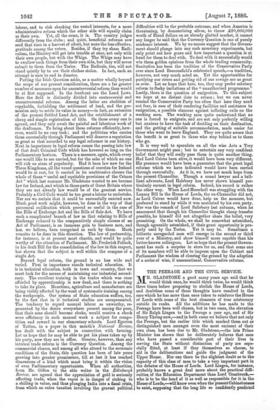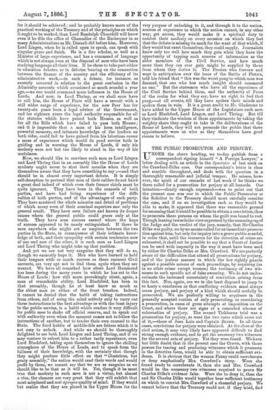THE PEERAGE AND THE CIVIL SERVICE.
MR. GLADSTONE a good many years ago said that he would think once, he would think twice, he would think three times before proposing to abolish the House of Lords, and doubtless some of these thoughts have resulted in the care which he has more than once taken to reinforce the House of Lords with some of the best elements of true aristocracy outside its ranks. All the additions he has made to the Peerage have been well chosen, but in two cases, the elevation of Sir Ralph Lingen to the Peerage a year ago, and of Sir Henry Thring now,—and in both cases we believe that not only the Peerage, but the earlier title which marked them out as distinguished men amongst even the most eminent of their own class, has been due to Mr. Gladstone,—the late Prime Minister has shown that he deliberately believes that men who have passed a considerable part of their lives in serving the State without distinction of party are espe- cially fitted, at least if they themselves so choose, to aid in the deliberations and guide the judgment of the Upper House. Nor can there be the slightest doubt as to the capacity of this class of men to take a very important part in the debates of the House of Lords. Lord Lingen, for instance, probably knows a great deal more about the practical diffi- culties of the Education Department than Lord Cranbrook, who is to be the head of it as well as responsible for it in the House of Lords,—wi]l know even when the present Cabinet ceases to exist, supposing that the long life so confidently predicted
for it should be achieved ; and he probably knows more of the practical working of the Treasury and of the principles on which it ought to be worked, than Lord Randolph Churchill will know even if he fills the office of Chancellor of the Exchequer in as many Administrations as Mr. Disraeli did before him. Moreover, Lord Lingen, when he is called upon to speak, can speak with singular grace and finish. He is a fine scholar, as well as a Minister of large experience, and has a command of language which is not always even at the disposal of men who have been studying language all their lives. If he chose to take part either in education debates, or in debates tearing on the connection between the finance of the country and the efficiency of its administrative work,—in such a debate, for instance, as recently occurred in relation to the great confusion in the Admiralty accounts which occasioned so much scandal a year ago,—no one would command more influence in the House of Lords. And now, in Lord Thring, as we shall soon have to call him, the House of Peers will have a recruit with a still wider range of experience, for the new Peer has for twenty-six years been a legal adviser of the Government, and for eighteen years the legal authority responsible for all the statutes which have passed both Houses, as well as for all the Bills which have failed to pass both Houses ; and it is impossible that a man of his keen intelligence, powerful memory, and intimate knowledge of the leaders on both aides, could fail to have gained from his laborious career a mass of experience which would do good service both in guiding and in warning the House of Lords, if only his modesty were not but too likely to stand in the way of his usefulness.
Now, we should like to convince such men as Lord Lingen and Lord Thring that in an assembly like the House of Lords modesty ought never to shut their mouths when they are themselves aware that they have something to say ;—and that should be in almost every important debate. It is simply self-deception to pretend that men of their calibre do not know a great deal indeed of which even their former chiefs must be quite ignorant. They have been in the counsels of both parties, and have had living experience of the diffi- culties of both parties, and of the advantages of each party. They have mastered the whole minutim and detail of problems of which many even of their nominal superiors saw only the general result. They have seen failure and known its deeper causes where the general public could guess only at the truth. They have seen success earned where the hope of success appeared to be nearly extinguished. If there be men anywhere who might act as umpires between the two parties in the State, in consequence of their intimate know- ledge of both, and their sympathy with certain tendencies now of one and now of the other, it is such men as Lord Lingen and Lord Thring who might take up that position.
And yet we are not very sanguine that they will do so, though we earnestly hope it. Men who have learned to hold their tongues with so much success as these eminent Civil servants, are very apt not to find them again when they are wanted. We have all remarked how silent Lord Hammond has been during the many years in which he has sat in the House of Lords ; how still more provokingly silent, again, a man of remarkable ability, Lord Blachford, has been in that assembly, though he at least knew as much as the ablest man on either of the front benches. Indeed, it cannot be denied that the habit of taking instructions from others, and of using the mind actively only to carry out these instructions to the best advantage or with the least injury to the public service, is a habit which renders it very difficult for public men to shake off official reserve, and to speak out with authority even when the moment comes not to follow the instructions of another, but to tender their own counsel to the State. The fixed habits of middle-life are fetters which it is not easy to unlock. And while we should be thoroughly delighted to see both Lord Lingen and Lord Thring, and if we may venture to exhort him to a rather tardy repentance, even Lord Blachford, taking upon themselves to ignore the chilling atmosphere of the House of Lords, and to speak from the fullness of their knowledge, with the certainty that though they might produce little effect on that "illustrious, but gouty assembly," the nation would read their words and would profit by them, we cannot say that we are as sanguine as we should like to be that so it will be, Yet, though it be most true that modesty in such men is not a virtue, but almost a vice, the chances are very great that they will exhibit that most misplaced and mai apropos quality of mind. If they would but realise that they are placed in the Upper House for the very purpose of unlocking to it, and through it to the nation, sources of experience to which the nation cannot, in any other way, get access, they would make it a spiritual duty to combat their modesty on every occasion on which they feel that the debate is missing its mark for the want of that which, if they would but exert themselves, they could supply. Journalists know only too well how much they gain when they have the opportunity of tapping such sources of information as the abler members of the Civil Service, and how much more than they can ever gain might be supplied by those from whom they derive it. The Persian who foresaw and wept in anticipation over the issue of the Battle of Platen, told his friend that "this was the worst pang to which man was doomed, that one who has much insight should command no one." But the statesmen who have all the experience of the Civil Service behind them, and the authority of Peers of the realm for what they say, have no right to feel that pang,—at all events, till they have spoken their minds and spoken them in vain. It is a great credit to Mr. Gladstone to have added to the Upper House of the Legislature such men as Lord Blachford, Lord Lingen, and Lord Thring. But till they vindicate the wisdom of these appointments by taking the weighty share they ought to take in the deliberations of the House of Lords, they will not persuade the public that these appointments were as wise as they themselves have good reason to believe.



































 Previous page
Previous page